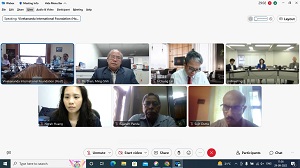The Vivekananda International Foundation organized a trilateral webinar with the Japan Institute of National Fundamentals and the Prospect Foundation on 29 September 2022 on "Emerging Strategic Environment in the Indo-Pacific". After initial remarks by Dr Arvind Gupta, Director VIF, Ms Yoshiko Sakurai, President JINF, and Dr I. Chung, President of Prospect Foundation, presentations were made by Mr Masanori Kondo, Visiting Researcher JINF, Dr Ming Shih Shen, Research Fellow and Director at Institute for National Defense & Security Research, and Amb Ashok Kantha, Distinguished Fellow VIF. The webinar discussed a range of issues from coercive activities of China in the Indo-Pacific to India-China Relations and what role can India and Japan play in a future Taiwan Straits contingency.
A pattern can be observed in China’s coercive behaviour in its four main theatres of contestation- East China Sea, South China Sea, Taiwan Straits and the India-China border. China wants to break out of its geostrategic limitations and challenge the US in the Indo-Pacific region, before challenging it for global supremacy. In East China Sea, China has not been able to alter the status quo despite unprecedented incursions into Japanese waters. However, in South China Sea, China has permanently altered the status quo despite Xi’s public commitment to Obama to not militarize reclaimed features. In 2018, Admiral Philip Davidson, the then INDOPACOM Commander acknowledged China was capable of controlling the South China Sea in all scenarios, short of war with the US. US-led Freedom of Navigation Operations have brought no significant change as the US ability to deter China is now far less with a closing US-China military gap. Then there is a new normal of coercive activities in Taiwan Straits with repeated transgressions of the median line. With regard to India-China border, despite recent disengagement at certain positions, tensions continue.
India-China relations have not been the same after the clash in Galwan Valley in June 2020. As the Indian External Affairs Minister, Dr S. Jaishankar, has constantly reiterated the ‘state of borders will define the state of relations’. Though some progress has been made in disengagement, but the situation is far from usual despite Chinese narratives of return to normalcy. This year will see the third winter deployment of Indian soldiers in very high altitude areas. However, India will engage China in multilateral forums such as the G20, SCO, BRICS, etc. After the 20th Party Congress, it is likely Xi Jinping will remain the leader in charge of external policies, including relations with India. President Xi became the primary interlocutor when Prime Minister Modi assumed office in India (earlier it was the Chinese Premier). There will be a trend towards tactical concessions to India without substantive accommodation of its interests, concerns and aspirations. For India, renewing its deterrence capabilities against China has assumed an urgency.
The Taiwanese side voiced the urgency to go beyond discussing ideas of grand strategy to tactical, strategic and operational cooperation with partner countries. They flagged cooperation through joint patrols, exercises and training, intelligence sharing, defense sales etc. On questions of what role they could play, the Japanese side acknowledged that a ‘Taiwan Emergency’ was a tantamount ‘Japan Emergency’. They explained how along with cooperation with the US, Japan has sought to increase its defense budget and build its own military capacities. The Indian side mentioned its major role in deterring China by placing 60,000 troops in Ladakh and stated its shared perception of Chinese aggression. All sides noted the need for Japan to transition to becoming a normal country in defense matters so that it can play its due role and discharge rightful responsibility.
All sides also acknowledged the need to reduce dependence on China and build alternative supply chains for future security and economic resilience. Technology cooperation remains a strong potential avenue for trilateral cooperation as evidenced by the project on LCD glass substrates by Japanese AvanStrate for Vedanta/ Foxconn’s mega investment in Gujarat. All VIF, JINF and Prospect Foundation participants appreciated the detailed and frank discussions that enumerated the strategic perspectives of India, Japan and Taiwan as the world passes through a very turbulent period globally and more so in the Indo-Pacific. All sides agreed on the need to continue this initial trilateral dialogue further with new agendas for discussion in the future.











Post new comment